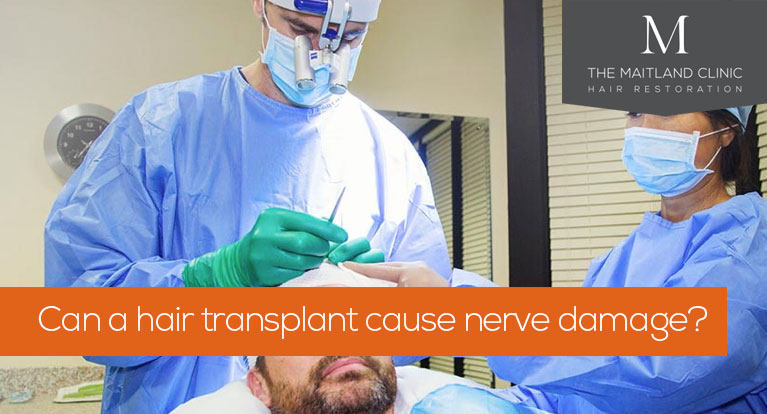Can a hair transplant cause nerve damage?
16th April 2020

At The Maitland Clinic we’re often asked whether a hair transplant can cause long-term side effects, such as nerve damage. Although the chance of experiencing complications or nerve damage after a hair transplant is minimal, as this post explains, it’s important to understand the risks before committing to hair restoration surgery.
Can a hair transplant cause nerve damage? As with any type of surgery, there’s a small risk that a hair transplant may result in damage to the surrounding nerves. It’s quite normal to experience some tingling and numbness in the scalp following a hair transplant as the nerves recover from the trauma of surgery. These side effects are usually short-term. However, in very rare cases the nerves may never fully heal and some numbness may remain.
To appreciate the potential risks associated with hair restoration surgery, it’s useful to have an understanding of how the process works.
What happens during a hair transplant?
To understand the small risks nerve damage from hair transplants, it’s key to understand how the procedures work.
There are two main methods of transplanting hair – Follicular Unit Transplant/strip (FUT) and Follicular Unit Excision/Extraction (FUE). Both procedures involve taking healthy hair grafts and implanting them into areas of the scalp affected by hair loss. The difference is in how the grafts are harvested.
During the FUT process, a healthy strip of hair-bearing skin is removed from the donor site, which is normally located at the back of the head. The site is then closed using small stitches and covered by the surrounding hair. The strip itself is divided into tiny grafts of individual follicular units comprised of one to four hairs.
The FUE technique, however, uses a 0.8mm to 1mm ‘punch’ device to extract individual follicular units directly from the patient’s scalp. The small holes left by FUE do not need to be stitched and will heal naturally within a few days leaving tiny dot scars.
After the grafts have been harvested, whether via FUT or FUE, the hairs are implanted into small incisions in the balding areas of the scalp. The Maitland Clinic’s renowned surgeon, Dr Edward Ball, executes this process with exceptional precision and artistry to create a natural look that blends seamlessly with the patient’s native hair.
The healing process
Following a hair transplant, you may have some redness and swelling of the scalp, and you will experience some scabbing in the recipient area of the scalp. Any discomfort should be mild and subside within a few days. Your scalp will usually be free of scabs around 10 days after surgery. The pinkness of the grafted area usually resolves within 14 days but may occasionally persist for several weeks.
It’s important to remember that the FUT technique leaves a linear scar, although this won’t usually be visible with a haircut of grade four or longer. However, the FUE process leaves a series of tiny dot scars barely noticeable to the naked eye, making it the preferred option for patients who would like to keep their hair very short.
Can a hair transplant cause nerve damage?
The scalp consists of a network of tiny nerve branches, which are positioned relatively close to the surface and provide sensitivity in the scalp. There’s a small risk that the incisions made during a hair transplant may sever or damage some of these nerve branches, resulting in numbness in parts of the scalp. Nerve damage may occur at the recipient site, the donor site, or both.
However, the effects of any damage are usually short-lived, as the nerves will normally regenerate and return to their full functionality within a few months. During this time, patients may experience some tingling, prickling or itching as sensation begins to return to the areas of the scalp affected by trauma.
In very rare cases, patients may continue to experience numbness after a hair transplant in isolated areas of the scalp after six months or more, which can be an indication of long-term nerve damage. If you have any concerns about your recovery, it’s always best to speak to your surgeon.
At The Maitland Clinic we take the consultation process very seriously and we always ensure patients are fully briefed about the potential risks and complications, however small, before committing to surgery.
How can I minimise the risk of nerve damage from a hair transplant?
To minimise the risk of hair transplant nerve damage and achieve the best possible results, it’s crucial that you only use a registered clinic and a qualified, highly experienced surgeon specialising in hair restoration.
With his background in plastic surgery and cosmetic medicine, Dr Ball is one of the world’s leading exponents in hair restoration surgery. Supported by an exceptional team at The Maitland Clinic, his outstanding skill and experience greatly reduce the risks associated with a hair transplant.
Furthermore, the advanced techniques used during surgery allow for exceptional control and precision, minimising the risk still further.
Which method of hair transplant is safest?
The likelihood of experiencing nerve damage is thought to be lower for patients undergoing the FUE technique. This is because FUE is a minimally invasive procedure that only results in bruising and minor trauma to the scalp, thus lowering the risk of nerve damage. By comparison, a larger piece of tissue is removed during FUT/strip surgery, which puts the scalp at slightly greater risk of nerve damage.
Whichever technique you choose, the risk of nerve damage remains low and, if it does occur, it’s highly unlikely to be permanent.
Exceptional aftercare at The Maitland Clinic
While the likelihood of experiencing complications is relatively small, it’s nevertheless important to follow the advice of your surgeon before and after your procedure. This means taking care of your scalp properly during the recovery period, for example by following instructions on washing your hair and returning to everyday activities.
The Maitland Clinic will provide you with everything you need to care for your new grafts following your surgery, including state-of-the-art Liposomal ATP aftercare sprays which promote the healing and growth of your new hair grafts. However, our support does not end once the grafts are secure and your scalp has healed.
We see our patients as lifelong beneficiaries of our hair care services, meaning you’ll have access to a lifetime of professional hair care. You’re welcome to return to us at any point, whether that’s months or even years after your treatment. Some of our patients like to visit us for further check-ups, top-up procedures or even just to say ‘hi’ – we love to see and hear how our patients are progressing after receiving treatment at the clinic.
The Maitland Clinic has an excellent record of performing successful FUT and FUE hair surgeries – you can view some of our success stories in our online gallery. To book a consultation please call us on 02392 706 122 or email us.










